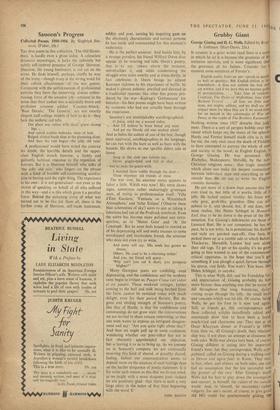Sassoon's Progress
THE first poem in this collection. 'The Old Hunts- man,' is hardly even a ghost today. A colourless dramatiC monologue, it lacks the infinitely but subtly self-centred presence of George Sherston. Sherston, the young huntsman, is not yet on the scene. He finds himself, perhaps, chiefly by way of the irony—though irony is the wrong word for their coltish effectiveness--of the war poems. Compared with the performances of professional satirists they have the unnerving. almost enibar- rassing, force of the amateur job—amateur in the sense that their author was a. suicidally brave and proficient amateur soldier. 'Counter-Attack,' `Base Details,' The General,' are not exactly elegant staff-college models of how to do it—they lack the aesthetic red tabs.
The place was rotten with dead: green clumsy legs .
And naked sodden buttocks, mats of hair, Bulged. clotted heads slept in the plastering slime, And then the rain began—the jolly old rain!
A professional would have noted the contrast no doubt, the horrible details and the upper- class English trench humour, a feebly and gallantly habitual response to the repetition of horrors. But it is Sherston himself who talks of `the jolly old rain.' who lingers on the phrase with a kind of humble self-communing satisfac- tion in having said the right thing. The experience is his own : it is not generalised—not even to the extent of speaking on behalf of all who suffered in this way—and it is this which gives it a peculiar force. Behind the sickening irony of what war turned out to be like for them all, there is the further irony of Sherston, self-made huntsman,
soldier and poet, turning his inquiring gaze on the absolutely characteristic and correct persona he has made and commanded for this moment's endurance.
• He is the perfect amateur. And beside him, by a strange paradox, his friend Wilfred Owen does
appear to be wearing red tabs. Owen's poetry, that is to say, towers above the moment, universalises it, and while condemning the struggle even more overtly and at times shrilly, in fact celebrates it. Owen brings 'an almost Keatsian richness to his experience of battle; he makes it almost aesthetic, jewelled and elevated in a traditional manner; like other fine poems pro- duced_ by the war—Kipling's 'Gethsemane' for instance—his best poems might have been written by someone who had not actually been through the experience.
Sassoon's are unmistakably autobiographical. 0 Jesus, send me a wound today,
And I'll believe in Your bread and wine
And get my bloody old sins washed white!
And as befits the author of one of the best, though most equivocal, autobiographies in the language, he can run with the hare as well as hunt with the hounds. He shows us our ignoble elders safe at home,
Snug at the club two fathers sat, Gross. goggle-eyed, and full of chat . . . —but he ends the poem with I watched them toddle through the door— These impotent old friends of mine.
The war over, his amateur status appears to falter a little. Which way now? His verse shows signs, sometimes rather endearingly grotesque ones, of trying to professionalise itself. 'Villa d'Este Gardens,' Fantasia on a Wittelsbach Atmosphere,' and 'Solar Eclipse' ('Observe these blue solemnities of sky') seem to aim at taking a laborious leaf out of the Prufrock notebook. Even the satire has become more polished and retro- spective, as in 'Menai Gate' and 'At the Cenotaph.' But he soon feels bound to remind us of his deprecating self and make excuses to some worshipped and inarticulate friend, the amateur who does not even try to write.
And some will say. 'His work has grown so dreary.'
Others, 'He used to be a charming writer.'
And you, my friend will query—
'Why can't you cut it short, you pompous blighter?'
Many Georgian poets are' confiding, even deprecating, and the confidences and the modesty soon begin to irritate us. Pauper Cinna vult videri et est pauper. Those weekend cottages, kettles coming to the boil and milk being fetched from the farm, cannot be revisited today with much delight, even for their period flavour. But the great and abiding strength of Sassoon's poetry, like that of Hardy, is that the confidences and communings do not grow stale; the conversations we are invited to share remain interesting, so that one even wants to express an intrigued disagree- ment and say : 'Are you quite right about that?' And then we might pull up in some confusion, wondering whether our poet-talker has not in fact obscurely apprehended our objection, but is leaving it to us to bring up. As we journey on in Sassoon's company we are continually receiving this kind of shared, or possibly shared, feeling. Indeed our communication seems to depend more on the nuances of such feelings than on the harder eloquence of poetic statement. It is for some such reason as this that we do not mind, as we might with a more eloquent poet—indeed we are positively glad—that there is such a very large entry in the index of first lines beginning with the word 'I.'
JOHN BAYLEY


































 Previous page
Previous page